The active natural charcoal mask is an ancient natural treatment method that has been used in Eastern medicine for thousands of years and has been used in Western medicine for about 150 years.
There are many uses and benefits of active natural charcoal masks, including the elimination of toxins, digestive health, anti-aging, tooth whitening and many more.

What Are the Health Benefits Of Active Natural Charcoal Mask?
The active natural charcoal mask absorbs bacteria, toxins, chemicals, dirt and other micro-particles on the skin surface and helps you get flawless skin and fight acne.
Charcoal is not metabolized, adsorbed or absorbed by the body, but can be used to treat some insect bites and disinfect some wounds.
It has been proven that active coal dust adsorbed mass thousands of times with harmful substances, making it a popular ingredient for facial masks.
0.2 grams of powdered active charcoal, 1 teaspoon of bentonite clay and 1 teaspoon of essential oil well mix and apply to the surface of the skin. To remove dirt from your skin, after 10 minutes with a damp cloth, gently rub natural charcoal mask.
Natural Charcoal Mask Is Great For Your Skin
When contacted with water, it is insoluble and because of porous surface-active charcoal removes dirt and oil in the skin.
If you are looking for the best mask for your skin problems, whether your complaint is excessive lubrication, blackheads or pimples, many brands are offering facial masks in different price ranges.
The main problem with them is that they are loaded with many toxic chemicals. Instead of exposing yourself to unnecessary chemicals that may damage your skin, you can make your natural charcoal mask.
Ingredients:
- 6 capsules of active charcoal.
- 3 tablespoons bentonite clay.
- 3 tablespoons of apple vinegar.
- 15 drops of pure rosehip oil.
- 3 drops of tea tree essential oil.
How Is It Done?
• Mix active charcoal powder and bentonite clay in a glass bowl using non-metallic materials such as silicone or wooden spoons (metals disable natural charge of clay).
• Add a tablespoon of apple cider vinegar and mix thoroughly until a paste is easily applied. When you add apple cider vinegar, you may feel a little splash.
• This is a normal reaction.
• Add 15 drops pure rosehip oil and 3 drops tea tree essential oil. Mix thoroughly to obtain a homogeneous mixture.
• Store in a refrigerated glass and airtight container.
Does Charcoal Mask Help Clean Blackhead?
You can make a perfect blackhead cleanser face mask using activated charcoal. Blackhead is a result of hardened sebum in the pores (naturally produced by the body).
It is not recommended for anyone to take or tighten blackhead, as this may cause further damage to the skin. Instead, you can do a blackhead face mask.
How Is It Used?
With your fingers or a mask brush, apply a homemade natural charcoal mask over your face and neck and avoid applying to your eyes. Leave to dry for about 20 minutes. Remove with warm water and apply a good moisturizer. For the best results, you can use this mask twice a week.

How Can You Remove Natural Charcoal Mask?
Clean natural charcoal mask with warm water and a cloth. Rinsing or peeling has a strong influence on the properties of active charcoal to absorb fat and to combat acne. Then you can apply a good tonic (or just apple cider vinegar), moisturizing cream and lotion.
Charcoal Mask For Blackhead
To make this simple blackhead mask, mix following ingredients in a glass bowl with 3 tablespoons of boiling water;
- 2 capsule active charcoal.
- Half teaspoon bentonite clay.
- 2 teaspoons of powder gelatin.
- 2 drops tea tree oil or lavender essential oil (optional).
Mix all ingredients thoroughly with a silicone spoon. Because gelatin will continue to concentrate, you may want to apply mask quickly with a brush. Allow for about 25 minutes to dry completely and then undress from the outside edge.
Warnings
Coal dust can cause mild constipation and should not be used regularly for a long time. Coal can cause nausea and vomiting, bowel obstruction, or perforation of the bowel. Also, prolonged breathing may cause respiratory complications.
Coal is not effective against strong alkali and acid poisons, cyanide, alcohol, caustic alkalies, boric acids, and mineral acids. If you have chest pain, swelling, redness, or hives, you should seek medical attention.
